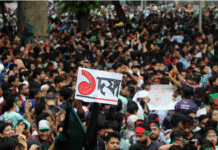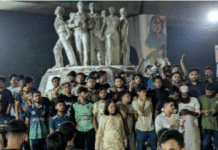After what the Jamaat did during the war, the party should have been dead and buried

- Time to get rid of violent elements
There has been no political party in Bangladesh to have created so much of a storm and rumpus as has Bangladesh Jamaat-e-Islami.
Just prior to, and immediately following, the liberation of the country, there were a number of left-leaning parties and underground extremist groups trying to formulate the impossible in the disconcerted situation of the time.
The leftists’ role in 1971 also raised questions in many quarters. But those were not taken into cognisance by the state powers. The leftists ran out of steam, but somehow survived in the sidelines of politics. Meanwhile, Jamaat stealthily managed to shape them up.
For the majority Muslim population of the country, Jamaat was looked upon as the only Islamic platform expected to bring about a change in the socio-political arena as a peaceful Islamic entity.
Meanwhile, secularists had been either trying to position their causes to cast the religious-minded populace out of mainstream politics, or to enhance their standing by way of maligning the genuine figures that did not belong to the secular stream. Separating religion from politics had been their primary agenda.
Things did not work for them till now. A large number of people with strong religious conviction still believe that there should be Islamic parties to influence the country, if not politically, socially at least.
Bangladesh is a country of peace-loving, religious-minded people. Not only do we see the majority Muslims, we also see Hindus, Christians, and Buddhists living in peace and amity.
Maulana Abul Ala Moududi, who was born in 1903 in Hyderabad, founded Jamaat in 1941. His aim was to launch the Islamic movement in India.
After partition, Jamaat split into factions. Workers and activists later became Jamaat leaders. Time, place, and context changed. So did their politics.
After what the Jamaat did during our war of liberation, the party should have been dead and buried with the sunrise of December 16, 1971.
But Jamaat never perished. It came back bit by bit, shaping up into a force. It made its way into mainstream politics and public minds.
That Jamaat was never a peace-loving party is beyond question. It has been gathering strength with the assistance of our own community.
One by one, the collaborators of Pakistan popped out from various corners of the land and dared to raise their political flag. BNP was their first refuge, and at a later period, they also teamed up with the Awami League as a partner in a movement for a caretaker government against the BNP.
Jamaat did not hesitate to go against the BNP to meet its selfish ends. It engaged Jamaat as its partner in its campaign against the BNP in 1996. So the AL also pampered Jamaat as friends in need.
These opportunities gave Jamaat a boost. They thought that since the AL could treat them as friends, they might now be an authentic force in Bangladesh politics.
It again joined the BNP-led front and became partners in government. Posing as an Islamic party, Jamaat expected support in the polls, since the mainstream population was Muslim. However, its share of votes did not pass the 3-4% mark at any time.
Jamaat was rejected by the people simply because of their barbaric role in 1971, and the politics of violence that they pursued.
After all these years, war criminals are standing trial and are being sent to the gallows.
Alas! Jamaat is still in the centre stage of our political discourse. The AL demands of the BNP to spurn Jamaat and come to dialogue with it. The BNP is not interested in following AL’s directives.
Even the just-concluded national polls centred around the absence or presence of the Jamaat in the fray. Jamaat has been disqualified from participating in any polls by the Election Commission.
There has been demand for outlawing Jamaat. The government, for reasons unknown, is unwilling to oblige.
It is time that we deal with the Jamaat issue. Now is the time to get rid of the violent elements in our politics. Don’t we have a finer political vision than Jamaati politics?
Source: Dhaka Tribune









